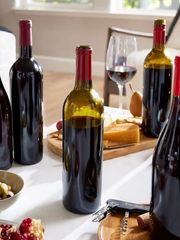 The main compounds responsible for grape color are called anthocyanin or polyphenols. The berry is preparing the seed for maturity by growing in size to ensure its protection from the elements. Just before veraison, a green harvest can sometimes be performed. The goal of a green harvest is to reduce the number of bunches, so the remaining bunches can get more energy, sugar and color. Those bunches will yield an overall higher quality to the consumer.
From this point on, depending on your geographical location and the varietal produced, full maturity will be completed between 35 and 80 days.
Maturation
Some grape varieties have bunches that ripen very unevenly. Uneven ripening is a characteristic that can be found in Pinot Noir, Sangiovese, Malbec, Gewürztraminer and Zinfandel. These varietals are more challenging to grow no matter what the climate is.
Over the summer, the entire plant is maturing, from the wood turning brown, growing in length and size, to the berries hardening and increasing their sugar content.
Harvest takes place over several months. For sparkling wines, more acid and less sugar is desirable, so grapes can be picked as early as the end of July but mainly in August. All varietals ripen at different times and from August to November, wineries fill up their tanks. In the Southern Hemisphere, harvest time is in full swing in February and March. In some cases, as in the making of ice-wine, harvest goes well beyond fall into wintertime.
The main compounds responsible for grape color are called anthocyanin or polyphenols. The berry is preparing the seed for maturity by growing in size to ensure its protection from the elements. Just before veraison, a green harvest can sometimes be performed. The goal of a green harvest is to reduce the number of bunches, so the remaining bunches can get more energy, sugar and color. Those bunches will yield an overall higher quality to the consumer.
From this point on, depending on your geographical location and the varietal produced, full maturity will be completed between 35 and 80 days.
Maturation
Some grape varieties have bunches that ripen very unevenly. Uneven ripening is a characteristic that can be found in Pinot Noir, Sangiovese, Malbec, Gewürztraminer and Zinfandel. These varietals are more challenging to grow no matter what the climate is.
Over the summer, the entire plant is maturing, from the wood turning brown, growing in length and size, to the berries hardening and increasing their sugar content.
Harvest takes place over several months. For sparkling wines, more acid and less sugar is desirable, so grapes can be picked as early as the end of July but mainly in August. All varietals ripen at different times and from August to November, wineries fill up their tanks. In the Southern Hemisphere, harvest time is in full swing in February and March. In some cases, as in the making of ice-wine, harvest goes well beyond fall into wintertime.
 Harvest time is a crucial moment when the grapes reach their perfect ripeness. Viticulturists and winemakers work around the clock to pick the grapes. Their spouses are called “Crush Widows” because they do not see them for weeks during this important time in the grapevine's vegetative cycle.
Harvest time is a crucial moment when the grapes reach their perfect ripeness. Viticulturists and winemakers work around the clock to pick the grapes. Their spouses are called “Crush Widows” because they do not see them for weeks during this important time in the grapevine's vegetative cycle.





